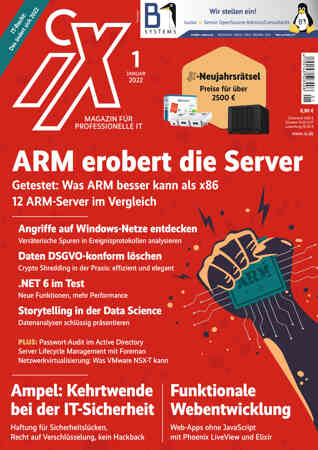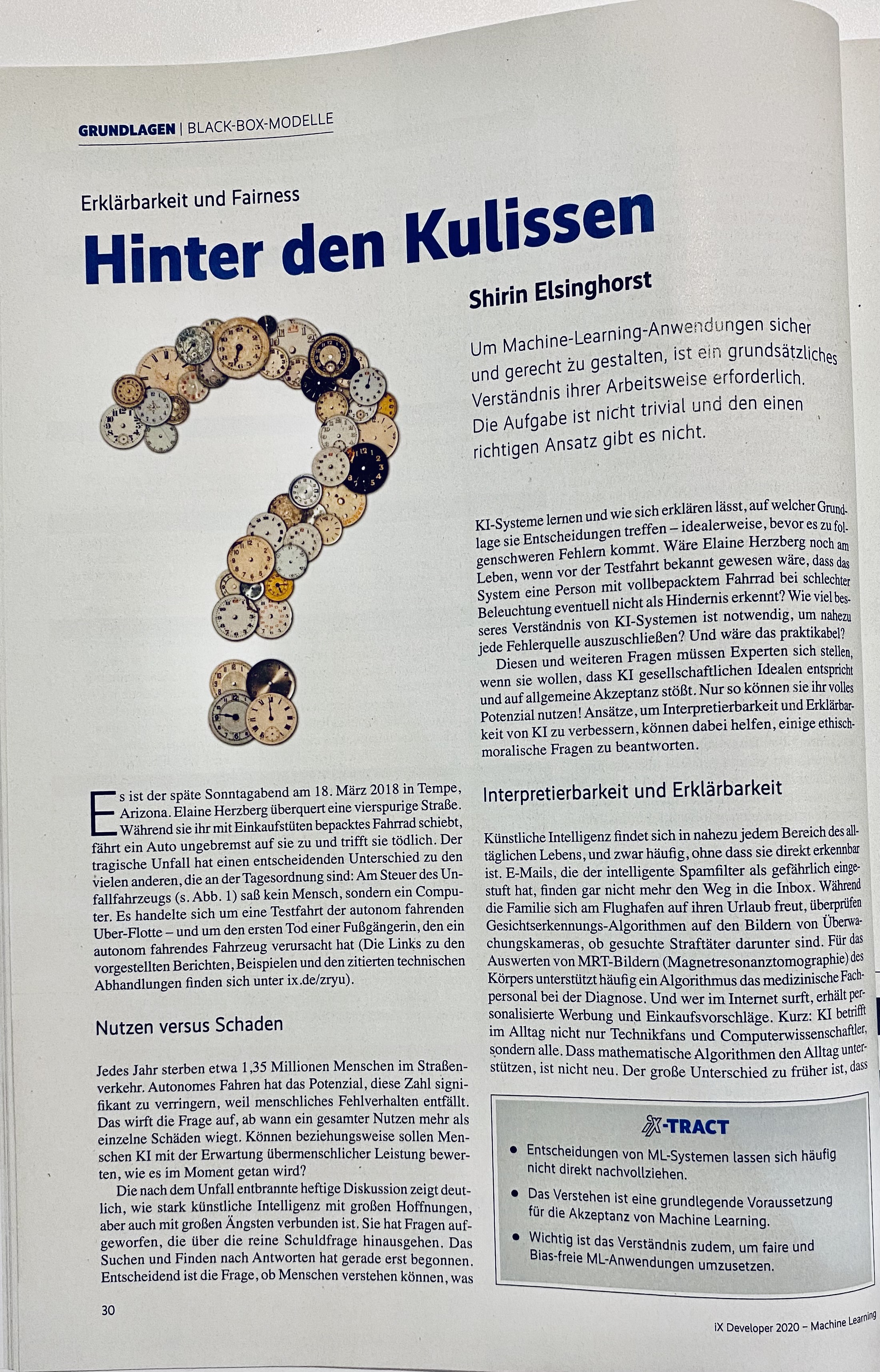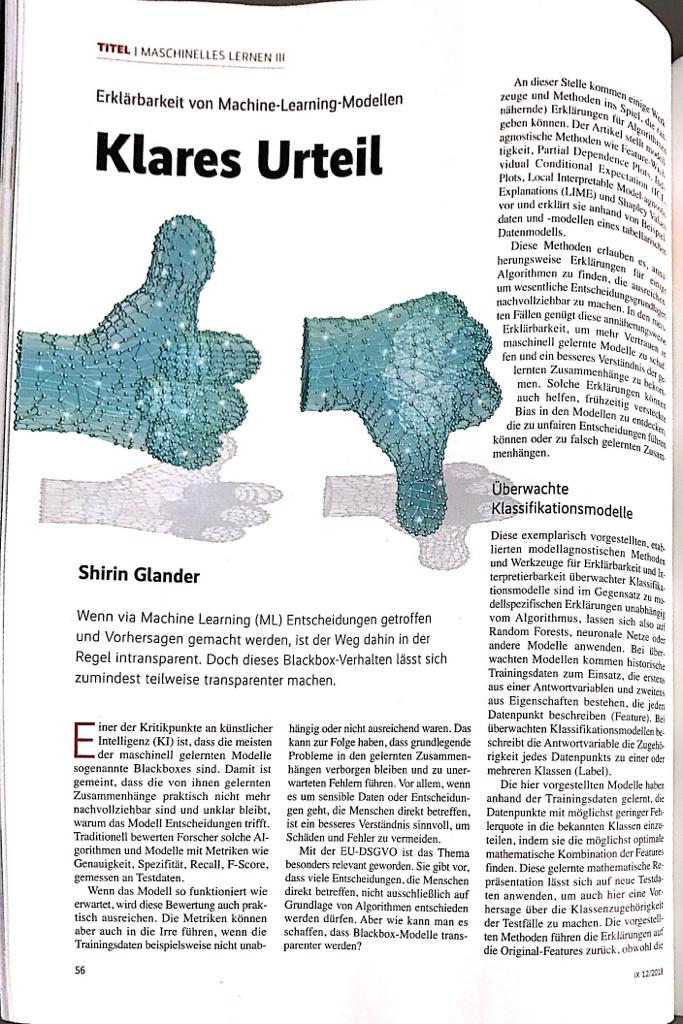Conferences, webinars, podcasts, workshops, books, articles and the likes
Here, you can find a list of all the talks I gave at conferences, webinars, podcasts, workshops, and all the other places you can and could hear me talk. You will also find a section with magazine articles and books I’ve written. :-)
If you have been enjoying my content and would like to help me be able to create more, please consider sending me a donation at paypal.me. Thank you! :-)
Interviews
- In November 2022, I gave an interview to the RConsortium talking about my motivation to start the MünsteR useR-group. You can read the interview here.
Where you find my written word
- In the German IT magazine iX 1/2022, I wrote an article about Data Storytelling. The complete code accompanying the article can be found here.

- In the German iX Developer special edition winter 2020/2021, I wrote again about fairness, explainability and ethics in machine learning.

-
A short version of this article about Explaining Black-Box Machine Learning Models in the iX 12/2018 (German)

- Book chapter Predictive Analytics (German): Data Science Grundlagen, Architekturen und Anwendungen Mai 2019, 336 Seiten, gebunden, dpunkt.verlag, ISBN Print: 978-3-86490-610-7

Upcoming talks, webinars, podcasts, etc.
None planned.
Past talks, webinars, podcasts, etc.
- At the Symposium Oeconomicum 2025, I was talking about New Business Models - KI als Treiber der Veränderung [German]
- At the tech&talk Meetup, I was talking about Responsible Data & AI Strategy
- At the Mittelstand-Digital Tag Münsterland 2024, I gave a workshop about Responsible Digital AI-Solutions
- At the minds mastering machines conference, I was a panelist talking about the EU AI-Act
- At the data:unplugged conference 2024, I was a panelist talking about the topic Ethics in AI
- At the Mittelstand-Digital Tag Münsterland 2023, I’ve been talking about Data Strategy (German).
- At the online SoftwerkerKonf 2023, I’ve been talking about Transparent & Responsible AI (German).
- At an internal event, I’ve also been presenting about Transparent & Responsible AI (German).
- At the same internal event, I’ve also been talking aboout Data Strategy (German).
- On September 21st 2023, I’ve been talking about Effectively communicating insights gained from data using Data Viz and Storytelling at the Big Data Fest II: Digital Health and Data Science of the Hochschule Heidelberg.
- In April & May 2023, you can hear me talk about Data and AI in the German SoftwerkerCast podcast. Part 2 is about Explainable AI (GERMAN).
- On November 23rd, 2022 I gave a talk about Data Security (GDPR) and Data Evaluation for the German KI Garage (content can’t be shared, however).
- On April 26th, 2022 I’ve beeen talking about Data Storytelling at the German Online Conference Data Science im Unternehmen.
- In September 2021, I had the opportunity to talk to the IML podcast about one of my favorite topics: ethics and interpretability in machine learning with special appearance of my 2-month-old: link to Spotify
- During the online Minds Mastering Machines conference, I gave a talk about The Good, the Bad and the Ugly: how to visualize machine learning data. Code and slides can be found here.
- At the ML Summit in April 2021, I gave a workshop on how to visualize data effectively. The code & resources are available on Github.
- At this year’s data2day conference on October 20th 2020 I talked about The Good, the Bad and the Ugly: how (not) to visualize data. You can find the German slides here and the code to create all plots here. You can watch the video recording of my talk (German) here.
- Because this year’s UseR 2020 couldn’t happen as an in-person event, I have been giving my workshop on Deep Learning with Keras and TensorFlow as an online event on Thursday, 8th of October. You can now find the full recording of the 2-hour session on YouTube and the notebooks with code on Gitlab.
- German only - RICHTIG GUT: DIE QUALITÄT VON MODELLEN VERSTEHEN Vortrag auf der M3 Online-Konferenz am 16.06.2020
Mit Machine Learning getroffene Entscheidungen sind inhärent schwierig – wenn nicht gar unmöglich – nachzuvollziehen. Ein scheinbar gutes Ergebnis mit Hilfe von maschinellen Lernverfahren ist oft schnell erzielt oder wird von anderen als bahnbrechend verkauft. Die Komplexität einiger der besten Modelle wie neuronaler Netze ist genau das, was sie so erfolgreich macht. Aber es macht sie gleichzeitig zu einer Black Box. Das kann problematisch sein, denn Geschäftsführer oder Vorstände werden weniger geneigt sein, einer Entscheidung zu vertrauen und nach ihr zu handeln, wenn sie sie nicht verstehen. Shapley Values, Local Interpretable Model-Agnostic Explanations (LIME) und Anchors sind Ansätze, diese komplexen Modelle zumindest teilweise nachvollziehbar zu machen. In diesem Vortrag erkläre ich, wie diese Ansätze funktionieren, und zeige Anwendungsbeispiele.
- On April, 11th, at the Data Science Meetup Bielefeld, I was talking about Building Interpretable Neural Networks with Keras and LIME.
- On March, 26th, I gave my talk about Explainable Machine Learning at the data lounge Meetup Bremen.
- On March, 15th, I talked about Deep Learning for Software Engineers at the AccsoCon 2019. You can find my slides here.
- At the This week in machine learning and AI European online Meetup on December 5th, 2018, I presented and led a discussion about the Anchors paper, the next generation of machine learning interpretability tools. You can find the slides here.
- On November 7th, Uwe Friedrichsen and I gave our talk from the JAX conference 2018: Deep Learning - a Primer again at the W-JAX in Munich.
- While in London for the M-cubed conference, I also gave a talk at the R-Ladies London Meetup about Interpretable Deep Learning with R, Keras and LIME.
- From 15th to 17th October 2018, I was in London for the M-cubed conference with my talk about Explaining complex machine learning models with LIME.
- Together with a colleague from codecentric, I gave a workshop about “END-2-END VOM KERAS TENSORFLOW-MODELL ZUR PRODUKTION” at the data2day conference, which was being held from September 25th - 27th 2018 in Heidelberg, Germany (German language): https://www.data2day.de/veranstaltung-6953-end-2-end-vom-keras-tensorflow-modell-zur-produktion.html?id=6953
- On Wednesday, October 26th, I was talking about ‘Decoding The Black Box’ at the Frankfurt Data Sciene Meetup. Slides can be found here and the recording is up on YouTube:
- At the ML Summit held on October 1st and 2nd in Berlin, Germany, I gave a workshop about image classification with Keras: https://ml-summit.de/specialized-topics/bildklassifikation-leicht-gemacht-mit-keras-und-tensorflow/ (German language)
- In August 2018 I gave a webinar for SAP about Explaining Keras Image Classification Models with LIME.
- In June 2018 I gave a 3-hour workshop about the basics of machine learning with R at the University of Heidelberg, Germany. Slides and workshop code can be found here.
- In May 2018 I was at the ROpenSci unconference in Seattle, WA You can read about my experience and the project I worked on here.
- At the Amazon AWS AI & Machine Learning Web Day on May 8th, I gave a presentation on how to get started with Amazon SageMaker. The recording can be found on YouTube; slides are on Slideshare
- I talked about explaining complex machine learning models at Minds Mastering Machines Conference on Wednesday, April 25th 2018 in Colone The presentation was in German but the slides were similar to those: https://shirinsplayground.netlify.com/2018/04/hh_datascience_meetup_2018_slides/
- My colleague Uwe Friedrichsen and I gave a talk at the JAX conference 2018: Deep Learning - a Primer on April 24th 2018 in Mainz. Slides can be found here: https://www.slideshare.net/ShirinGlander/deep-learning-a-primer-95197733
Deep Learning is one of the “hot” topics in the AI area – a lot of hype, a lot of inflated expectation, but also quite some impressive success stories. As some AI experts already predict that Deep Learning will become “Software 2.0”, it might be a good time to have a closer look at the topic. In this session I will try to give a comprehensive overview of Deep Learning. We will start with a bit of history and some theoretical foundations that we will use to create a little Deep Learning taxonomy. Then we will have a look at current and upcoming application areas: Where can we apply Deep Learning successfully and what does it differentiate from other approaches? Afterwards we will examine the ecosystem: Which tools and libraries are available? What are their strengths and weaknesses? And to complete the session, we will look into some practical code examples and the typical pitfalls of Deep Learning. After this session you will have a much better idea of the why, what and how of Deep Learning, including if and how you might want to apply it to your own work. https://jax.de/big-data-machine-learning/deep-learning-a-primer/
- I talked about explaining complex Machine Learning Models with LIME at this meetup: Data Science Meetup Hamburg on Thursday, April 12th 2018. Slides can be found here: https://shirinsplayground.netlify.com/2018/04/hh_datascience_meetup_2018_slides/
Traditional machine learning workflows focus heavily on model training and optimization; the best model is usually chosen via performance measures like accuracy or error and we tend to assume that a model is good enough for deployment if it passes certain thresholds of these performance criteria. Why a model makes the predictions it makes, however, is generally neglected. But being able to understand and interpret such models can be immensely important for improving model quality, increasing trust and transparency and for reducing bias. Because complex machine learning models are essentially black boxes and too complicated to understand, we need to use approximations to get a better sense of how they work. One such approach is LIME, which stands for Local Interpretable Model-agnostic Explanations and is a tool that helps understand and explain the decisions made by complex machine learning models. Dr. Shirin Glander is Data Scientist at codecentric AG. She has received a PhD in Bioinformatics and applies methods of analysis and visualization from different areas - for instance, machine learning, classical statistics, text mining, etc. -to extract and leverage information from data.
- I talked about Deep Learning with Keras in R and Python at this meetup: Ruhr.Py 2018 on Wednesday, April 4th 2018. Slides can be found here: https://shirinsplayground.netlify.com/2018/04/ruhrpy_meetup_2018_slides/
Introducing Deep Learning with Keras and Python Keras is a high-level API written in Python for building and prototyping neural networks. It can be used on top of TensorFlow, Theano or CNTK. In this talk we build, train and visualize a Model using Python and Keras - all interactive with Jupyter Notebooks!
In January 2018 I was interviewed for a tech podcast where I talked about machine learning, neural nets, why I love R and Rstudio and how I became a Data Scientist.
In December 2017 I talked about Explaining Predictions of Machine Learning Models with LIME at the Münster Data Science Meetup.
In September 2017 I gave a webinar for the Applied Epidemiology Didactic of the University of Wisconsin - Madison titled “From Biology to Industry. A Blogger’s Journey to Data Science.” I talked about how blogging about R and Data Science helped me become a Data Scientist. I also gave a short introduction to Machine Learning, Big Data and Neural Networks.
In March 2017 I gave a webinar for the ISDS R Group about my work on building machine-learning models to predict the course of different diseases. I went over building a model, evaluating its performance, and answering or addressing different disease related questions using machine learning. My talk covered the theory of machine learning as it is applied using R.
Publications
Shirin Glander, Fei He, Gregor Schmitz, Anika Witten, Arndt Telschow, J de Meaux; Genome Biology and Evolution, 22nd June 2018, evy124, https://doi.org/10.1093/gbe/evy124
K Christin Falke · Shirin Glander · Fei He · Jinyong Hu · Juliette de Meaux · Gregor Schmitz., Nov. 2011, Current Opinion in Genetics & Development
Luisa Klotz et al. 2019. Science Translational Medicine, May 2019
Lena Wildschütz, Doreen Ackermann, Anika Witten, Maren Kasper, Martin Busch, Shirin Glander, Harutyun Melkony, Karoline Walscheid, Christoph Tappeiner, Solon Thanos, Andrei Barysenka, Jörg Koch, Carsten Heinz, Björn Laffer, Dirk Bauer, Monika Stoll, Simon König, Arnd Heiligenhaus. Journal of Autoimmunity, Volume 100, June 2019, Pages 75-83
Marie Liebmann, Stephanie Hucke, Kathrin Koch, Melanie Eschborn, Julia Ghelman, Achmet I. Chasan, Shirin Glander, Martin Schädlich, Meike Kuhlencord, Niklas M. Daber, Maria Eveslage, Marc Beyer, Michael Dietrich, Philipp Albrecht, Monika Stoll, Karin B. Busch, Heinz Wiendl, Johannes Roth, Tanja Kuhlmann, Luisa Klotz. Proceedings of the National Academy of Sciences, August 2018, DOI: 10.1073/pnas.1721049115
Ulas et al., May 2017, Nature Immunology
Workshops
The following workshops are not being offered on a regular basis any more. Please inqurie individually, if you are interested in the following content:
- Machine Learning Basics in R (ENG or GER)